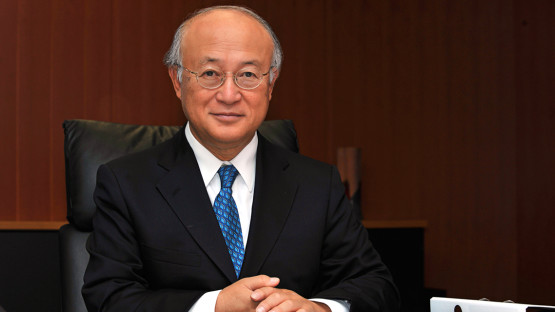The IAEA and the Institute for Nuclear Research Pitești (ICN) in Romania will strengthen their cooperation to build nuclear capacity across Eastern Europe and Central Asia, contributing to increased technical knowledge and safety.
“Romania is a valued partner of the IAEA in all areas of our activity,” IAEA Director General Yukiya Amano said at the Institute today. “Cooperation such as that between the IAEA and the Institute will make an important contribution to strengthening nuclear safety in this region, and beyond.”
Mr Amano thanked the Institute’s management and staff for hosting 27 fellows from developing countries over the last few years under various IAEA technical cooperation projects. The young scientists received training and carried out practical work in nuclear safety, nuclear chemistry, safety assessment and the safe operation of research reactors.
Serban Valeca, President of the ICN Research Council, said that the visit marked an important milestone for the Institute. “Today’s ceremony on the occasion of IAEA Director General’s visit to Romania opens a new chapter for the international cooperation in Romanian education and research,” he said.
Last year, the IAEA and the Institute signed a Practical Arrangement on Cooperation in the area of Scientific and Technical Support to Member States in Nuclear Safety. This Arrangement will increase the availability of nuclear safety training courses, including in emergency preparedness and response in case of a nuclear or radiological emergency, across Eastern Europe and Central Asia, Mr Amano said.
The Institute, located 120 kilometres northwest of Bucharest, was established in 1971 with the technical support of the IAEA. More recently, the IAEA facilitated the conversion of the Institute’s research reactor to low enriched uranium fuel in 2010.
This long-standing cooperation is expected to intensify in coming years, Mr Amano said. “Ensuring the availability of highly qualified staff to assume responsibility for the safe, secure and sustainable operation of nuclear facilities in the coming decades is extremely important,” said Mr Amano. “Cooperation such as that between the IAEA and the Institute will make a very valuable contribution to the training of the next generation of nuclear power professionals.”
Mr Amano visited the Institute as part of a three-day trip to Romania. He has met President Klaus W. Iohannis, Vice Prime Minister Costin Borc, and Minister of Foreign Affairs Lazăr Comănescu, discussing Romania’s nuclear power programme and the IAEA’s support to the country in various areas of peaceful use of nuclear technology.




